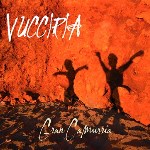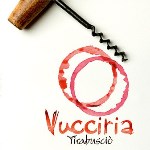Vucciria is a band that performs folk music from Italy’s southernmost region, Sicily. In my case, being from central Spain, and talking about a band and their music from a country, a culture and its language, that may seem so similar (but still quite different) to those from my home country, may become a risky attempt.
Let’s start with the band’s name: Vucciria. I realize that it is also the name of the famous market in the Sicilian capital city of Palermo, and the origin of the name might be traced back to the French word ‘boucherie’ (butcher shop), which also reminds me the famous market in Barcelona, ‘la Boquería’. It seems that in Palermo’s dialect, the word Vucceria also means something like ‘clutter’ or ‘confusion’ as caused by shouting of the market sellers announcing their daily products, and the customers chatting and walking up and down.
The four Vucciria CD’s that arrived to me range from 2006 thru 2019, and along those thirteen years the only band members that have remained in the band are (if I am not wrong) Giuseppe Perna (voice, ‘marranzano’/Jew’s harp), Toti Denaro (voice, percussion, guitar, mandolin, bass, violin), and Manu Mazé (accordeon, accordina). When I start listening their 2006’s album ‘Gran Camurria’, I must say I do not so immediately identify the folkloric beats, the instruments, or the melodies that are commonly stereotyped as ‘traditional Italian’ (neither from the north or the south), but I am sure that anybody knowledgeable on Italian folk music can prove me wrong. It is true when I listen more carefully, to many of the songs I hear the ‘tamburellos’ (tambourines), the mandolin, the Sicilian flute and some familiar rhythms.
The first song ‘Assummata di lu Corpu di la Tunnara’ (with a meaning related to the catching and lifting of the tuna fish bodies...) is labeled as a ‘traditional’ song, but just listening to the introduction with the percussion you could easily think on a fusion with north or even central African influences. Nevertheless, the electric bass guitar (Andi Kober) and drum set (Toti Denaro) progressively turn Vucceria’s sound into more jazzy or pop/rock style of music. That becomes clear in the following tune ‘L’Arca di Noè’ (‘Noah’s Arch’), written by Toti Denaro and Peppe Perna, where only the flute of Giuseppe Viola added a simple rustic touch to the melody. ‘La Barunissa di Carini’, also traditional from Sicily, is a beautiful song developed with very relaxing jazz moods with guitar (Samuele Vivian), bass (Andi Kober), piano (Antonio Zarcone), sax (Giuseppe Viola), and the voice of Alessandro Perna.

Then I arrive to ‘Don Totó’, an interesting song, whose lyrics seem to refer to somebody, quite powerful but who apparently caused great pain and bloodshed, with mentions to ambulances and police, screams, yells, tears, and the plucked mandolin playing some notes from 1972’s ‘The Godfather’ theme song by Nino Rota. Being Vucciria a Sicilian band I could guess this song was (maybe) about the sadly famous Salvatore ‘Totó’ Riina (1930—2017), but I may be probably totally wrong. Also interesting the last song, ‘Del Querer a no Queré’, with Alejandra Bertolino García playing harmonium and singing in Spanish.
In 2008 Vucciria released the album ‘Cuè?’, which starts with the lively and powerful tune ‘Ajeri (‘Yesterday’), pop- rock style. In ‘Occhi Turchini’ (‘Turkish Blue Eyes’), the traditional lyrics are interpreted in a fusion with reggae- ska beats, with mandolin. When I get to ‘La Leggenda di Colapesce’, ‘Viaggio in Sicilia’ or ‘Miniminagghia’, I again identify the traditional sounds, and the tarantella like rhythms, but trying to understand the Sicilian lyrics I realize once more how my basic knowledge of Italian does not help me at all to understand the stories (I believe I can even understand better all the German translations included in all the CD booklets).

In 2013, Vucciria published the CD ‘Pó tû cuntu’, which has an energetic start with the folk tune that gives the name to the whole album. It is followed by ‘Lu Mungibeddu’, a blend of a Ska like beat and lyrics about the Mount Etna volcano. ‘La Cucchiara’ (‘The Spoon’) is a sweet waltz on the accordion, also composed by Toti Denaro like most of the other tunes in the album. The CD continues swinging between the traditional sound and the crossover with others styles, like the pop in ‘Ali Pecuri’, and then back to southern Italian folk in ‘Tutti li santi’ (‘All the Saints’), or even the Albanian tradition in ‘O ne bukura more’. The final traditional song, ‘Novena’, incorporates the zampogna, the Italian traditional bagpipes performed by Giuseppe Viola.
‘Tirabuscio’ (‘Corkscrew’) is the last album published by Vucciria in 2019, the band’s line up is (same as in the prior ‘Pó tû cuntu’): Giuseppe Perna (mouth harp, vocals), Toti Denaro (vocals, percussion, guitar, mandolin, bass, violin), Nicolo Loro Ravenni (sax, flute, clarinet), Manu Mazé (accordion, accordina). The second tune, ‘Sicilia’, is an interesting sort of odd meter rhythm with melodies and lyrics which emphasize the multicultural background in the history of the island: Phoenician, Greek, Latin, Arab, Norwegian, Turkish, German, Spanish, French,... Consistent with the prior albums, Tirabuscio alternates more traditional sounds like in ‘Lu Schirpiuneddu’, ‘Settibeddu’, or ‘Mu Scurdai’, with pop music styles, such as in ‘Lu Piritu’, the relaxing and beautiful ‘Si putissi’, or the blend between tradition and jazzy woodwinds in ‘Bela figliola’.
I would say Vucciria’s albums provide a perfect landscape to start getting familiar with the Sicilian traditional sounds, while keeping the perspective from our contemporary popular music.
Vucciria: “Gran Camurria”, 2006; “Cuè?”, 2008; “Pó tû cuntu!”, 2013; “Tirabuscio”, 2019.
Photo Credits:
(1)-(3) Vucciria
(unknown/website).